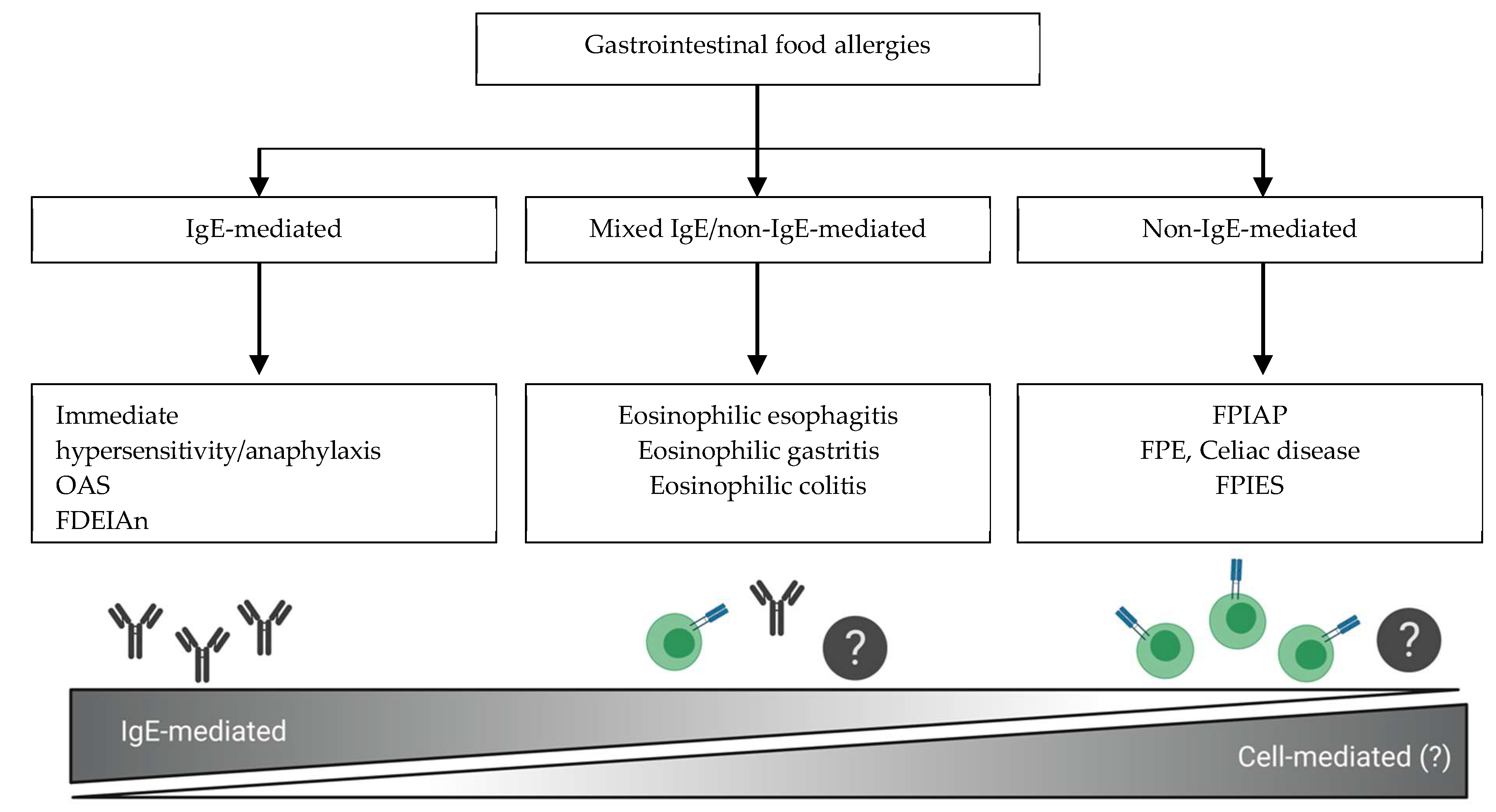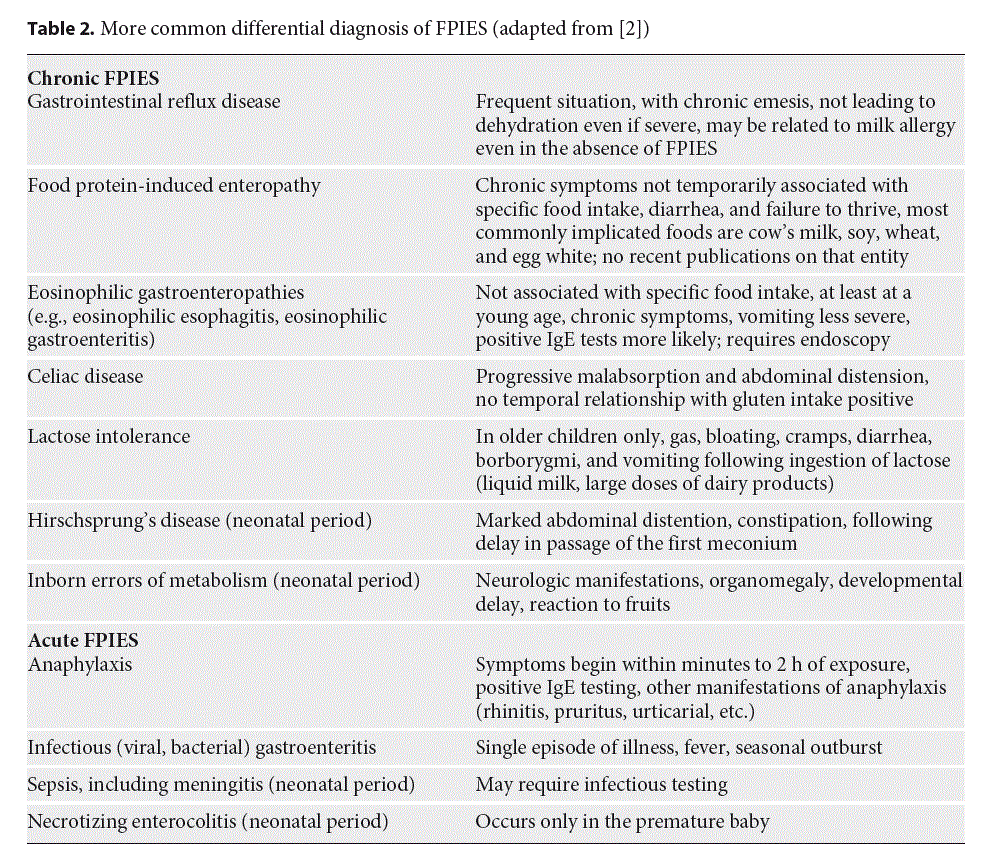food protein induced enterocolitis syndrome treatment
When most kids have an allergic reaction to a food like peanut butter you see signs right away. The term enterocolitis specially refers to inflammation of the small and large intestines.

Comparison Between Acute And Chronic Food Protein Induced Enterocolitis Download Scientific Diagram
Unlike typical food allergies symptoms may not be.

. Individuals with FPIES experience profuse vomiting and diarrhea that usually develops. Avoidance of the trigger foods is the mainstay of treatment. If your child has solid-food FPIES your allergist may suggest introducing fruits and vegetables pears bananas and potatoes for example rather than cereals and grains.
An often underdiagnosed and misdiagnosed condition FPIES was not associated with its own diagnostic code until 2015. The same is true for the breast-feeding mother if there is a clear connection between breast milk intake and the babys symptoms. FPIES Explained Its estimated that food allergies affect 6 of children in the first two years of life.
Food protein-induced enterocolitis syndrome FPIES is a rare food allergy that affects the gastrointestinal tract. Learn about how the condition is diagnosed and treated at Childrens Hospital of Philadelphia. There is no specific treatment for.
Classic symptoms of FPIES include profound vomiting diarrhea and dehydration. Food protein-induced enterocolitis syndrome FPIES is a non-IgE mediated food allergy characterized by delayed vomiting in infants that was first described in the 1970s. In the last years the interest of the scientific community toward food protein-induced enterocolitis syndrome FPIES has grown exponentially.
We review here the peculiar characteristics of this syndrome. The best way to manage FPIES is to strictly avoid the food that triggers an allergic reaction. Those treatments will help lessen the FPIES reaction but they wont treat the condition.
Enterocolitis is inflammation involving both the small intestine and the colon large intestine. FPIES is food protein-induced enterocolitis syndrome. Despite the potential seriousness of reactions awareness of FPIES is low.
It turns out that both children had a rare food allergy called food proteininduced enterocolitis syndrome FPIES for which theres no laboratory test. High-quality studies providing insight into the pathophysiology diagnosis and management are lacking. But if your child has a rare allergy called food protein-induced enterocolitis syndrome FPIES.
The preventive diet will only be implemented if at the time of the FPIES. NUTRITIONAL MANAGEMENT OF FOOD PROTEIN-INDUCED ENTEROCOLITIS SYNDROME FPIES With FPIES your childs diet and food have to be monitored to enable better management till your child can outgrow the allergies. The recent publication of the First International Consensus Guidelines allowed a positive interaction between different research groups with.
These infants were tested for food allergies but the results came back negative. In emergency situations the primary treatment for an FPIES episode is intravenous fluids for rehydration. Extensively hydrolyzed casein formula is recommended for infants that cannot breastfeed because concomitant CM and soy FPIES occur in up to 40 of cases69In the majority of infants with CM andor soy FPIES symptoms resolve within 310 days of starting extensively hydrolyzed casein formula.
And clinical outcomes are poorly established. If your child has FPIES to milksoy formula your allergist may advise you switch to using a hypoallergenic formula such as a casein hydrolysate-based formula. The only way to prevent a Food Protein-Induced Enterocolitis Syndrome FPIES reaction is to strictly avoid the culprit food in the diet.
The International FPIES Food Protein-Induced Enterocolitis Syndrome Association is a recognized 501c3 nonprofit corporation and organization that provides education support and advocacy for individuals with Food Protein-Induced Enterocolitis Syndrome FPIES and. Prevention and Management. Mediated food allergy cell mediated gastrointestinal oral food challenge mediated gastrointestinal food.
This requires careful attention to your childs diet. If a severe reaction does occur treatment includes the administration of intravenous fluids to counteract fluid loss from vomiting and diarrhea. Food protein-induced enterocolitis syndrome FPIES is a non-IgE-mediated food allergy that manifests with projectile repetitive emesis that can be followed by diarrhea and may be accompanied by lethargy hypotonia hypothermia hypotension and metabolic derangements.
An overview of Protein Induced Enterocolitis. Steroid treatments may also be used to lessen an immune reaction. Food Protein-Induced Enterocolitis Syndrome FPIES is a type of food allergy affecting the gastrointestinal GI tract.
1 FPIES usually starts in infancy although onset at older ages is. The only treatment for FPIES is to avoid the trigger food. Food protein-induced enterocolitis syndrome FPIES is a nonIgE-mediated food allergic disorder that can manifest with symptoms of projectile repetitive emesis that can be followed by diarrhea and may be accompanied by lethargy hypotonia hypotension hypothermia and metabolic derangements.
Treatment for FPIES must be individualized and is often modified as the child grows. Your doctor will advise as to how to alter the diet to achieve this and you may receive advice from a dietitian if the foods to be removed include a major food group. The administration of corticosteroids.
FPIES usually starts in infancy although onset at older ages is being increasingly recognized. It is commonly pronounced F-Pies as in apple pies though some doctors may refer to it as FIES pronounced fees considering food-protein as one word. These symptoms can lead to severe lethargy change in body temperature and blood pressure.
Food protein-induced enterocolitis syndrome FPIES is an uncommon disorder characterized by an allergic reaction to food that affects the gastrointestinal system. Food proteininduced enterocolitis FPIES is a non-IgE cell-mediated food allergy that can be severe and lead to shock. If your young infant has FPIES caused by a cows milk-based infant formula their pediatrician might also recommend avoiding soy formula given that infants with FPIES to cows milk can also have FPIES to soy.
Intravenous fluids to help severe dehydration.

Nutrients Free Full Text Non Ige Mediated Gastrointestinal Food Allergies In Children An Update Html

Dietary Management Of Food Protein Induced Enterocolitis Syndrome During The Coronavirus Disease 2019 Pandemic Annals Of Allergy Asthma Immunology

Gastrointestinal Immunopathology Of Food Protein Induced Enterocolitis Syndrome And Other Non Immunoglobulin E Mediated Food Allergic Diseases Sciencedirect

Food Protein Induced Enterocolitis Syndrome And Proctocolitis

Description Of Differences And Similarities Between Fpies Fpe And Download Scientific Diagram

Managing Food Protein Induced Enterocolitis Syndrome During The Coronavirus Disease 2019 Pandemic Annals Of Allergy Asthma Immunology

Food Protein Induced Enterocolitis Syndrome Annals Of Allergy Asthma Immunology

References In Immunopathophysiology Of Food Protein Induced Enterocolitis Syndrome Journal Of Allergy And Clinical Immunology

Manifestations Diagnosis And Management Of Food Protein Induced Enterocolitis Syndrome Pediatric Annals

Management Of Acute Food Protein Induced Enterocolitis Syndrome Emergencies At Home And In A Medical Facility Annals Of Allergy Asthma Immunology

Food Protein Induced Enterocolitis Syndrome Oral Food Challenge Annals Of Allergy Asthma Immunology

Oral Food Challenge In Food Protein Induced Enterocolitis Syndrome Download Table
Two Case Reports Of Food Protein Induced Enterocolitis

Clinical Types Of Food Protein Induced Enterocolitis Syndrome Fpies Download Scientific Diagram
Two Case Reports Of Food Protein Induced Enterocolitis

Interpretation Of The Food Protein Induced Enterocolitis Syndrome Oral Download Table

Tweets With Replies By Eastmidsfoamed Em3foamed Twitter

Clinical Types Of Food Protein Induced Enterocolitis Syndrome Fpies Download Scientific Diagram

References In Food Protein Induced Enterocolitis Syndrome Not So Rare After All Journal Of Allergy And Clinical Immunology